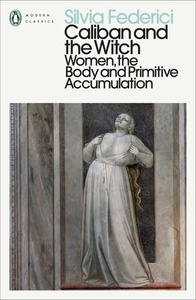Take a photo of a barcode or cover
informative
inspiring
reflective
fast-paced
challenging
emotional
informative
inspiring
reflective
slow-paced
informative
inspiring
medium-paced
informative
inspiring
reflective
slow-paced
challenging
informative
reflective
slow-paced
Interesting read but a bit repetitive.
I really loved the thoughts and arguments presented here, but my god was it a struggle to get through. Federici's style is just so dry, dense, and academic. While intentional, it made me struggle at times to understand what exactly she was saying, especially when it came to the finer details of the rise of capitalism.
challenging
dark
emotional
informative
inspiring
reflective
sad
tense
slow-paced
heel erg goed: we moesten voor een vak zo ongeveer 1/3e lezen (dus dan kun je het maar net zo goed helemaal doen toch). fijne en terechte kritiek op Marxistische theorie en Foucaults definities van o.a. biopower, ook interessant omdat heksenjachten natuurlijk vrij abstract en ietwat luchtig klinken, maar deze dus wel een enorme rol hebben gespeeld in het kneden en creëren van dat afgrijselijke fucking patriarchaat waar we nog altijd mee zitten opgezadeld!
Caliban and the Witch is an important Marxist feminist examination of primitive accumulation in the transition from feudalism to capitalism.
Federici argues that this process necessitated the “subjugation of women to the reproduction of the work force”, and that the witch hunts of the 16th and 17th centuries served to destroy women’s power and solidify the new relations of production. As racial divisions were required to enable colonialism, so too were gender divisions capitalism - women had to be treated as less-than and relegated to unpaid labour within the home to ensure the male, waged worker’s labour was consistently available to this new mode. That around this time there was a cultural shift toward consideration of the human body as a mere machine of little value, either separate from a soul or totally lacking one - of which the philosophy of Descartes and Hobbes is representative - is not coincidental.
Quite a bit is covered in this book, and I learnt quite a lot from it. I enjoyed it most when it was grounded in a strong materialist analysis, particularly the first half or so. Occasionally, it steps into more speculative territory, even exaggeration, where it’s less convincing but still interesting to think about. Other than the odd awkwardly phrased sentence here and there it was much more readable than I’d expected too; I appreciate that Federici doesn’t get caught up in an overly formal academic style and makes the content pretty accessible. Since this assumes familiarity with certain Marxist ideas I wouldn’t necessarily recommend it without some of that background, but it’s definitely a worthwhile read.
Federici argues that this process necessitated the “subjugation of women to the reproduction of the work force”, and that the witch hunts of the 16th and 17th centuries served to destroy women’s power and solidify the new relations of production. As racial divisions were required to enable colonialism, so too were gender divisions capitalism - women had to be treated as less-than and relegated to unpaid labour within the home to ensure the male, waged worker’s labour was consistently available to this new mode. That around this time there was a cultural shift toward consideration of the human body as a mere machine of little value, either separate from a soul or totally lacking one - of which the philosophy of Descartes and Hobbes is representative - is not coincidental.
Quite a bit is covered in this book, and I learnt quite a lot from it. I enjoyed it most when it was grounded in a strong materialist analysis, particularly the first half or so. Occasionally, it steps into more speculative territory, even exaggeration, where it’s less convincing but still interesting to think about. Other than the odd awkwardly phrased sentence here and there it was much more readable than I’d expected too; I appreciate that Federici doesn’t get caught up in an overly formal academic style and makes the content pretty accessible. Since this assumes familiarity with certain Marxist ideas I wouldn’t necessarily recommend it without some of that background, but it’s definitely a worthwhile read.
Just as the Enclosures expropriated the peasantry from the communal land, so the witch-hunt expropriated women from their bodies, which were thus ‘liberated’ from any impediment preventing them to function as machines for the production of labor. For the threat of the stake erected more formidable barriers around women’s bodies than were ever erected by the fencing off of the commons.
I was biased starting this since I already knew I would agree with the books politics but I still felt like I learned a lot
I am a bit skeptical since many of the lower-star reviews are saying that the arguments are cherry picked and pseudo-historical (and I honestly don’t know anything about that) but it was interesting to read anyway
Regardless of the books historical reliability I still think the argument it’s intersectionality is incredibly important
I am a bit skeptical since many of the lower-star reviews are saying that the arguments are cherry picked and pseudo-historical (and I honestly don’t know anything about that) but it was interesting to read anyway
Regardless of the books historical reliability I still think the argument it’s intersectionality is incredibly important






